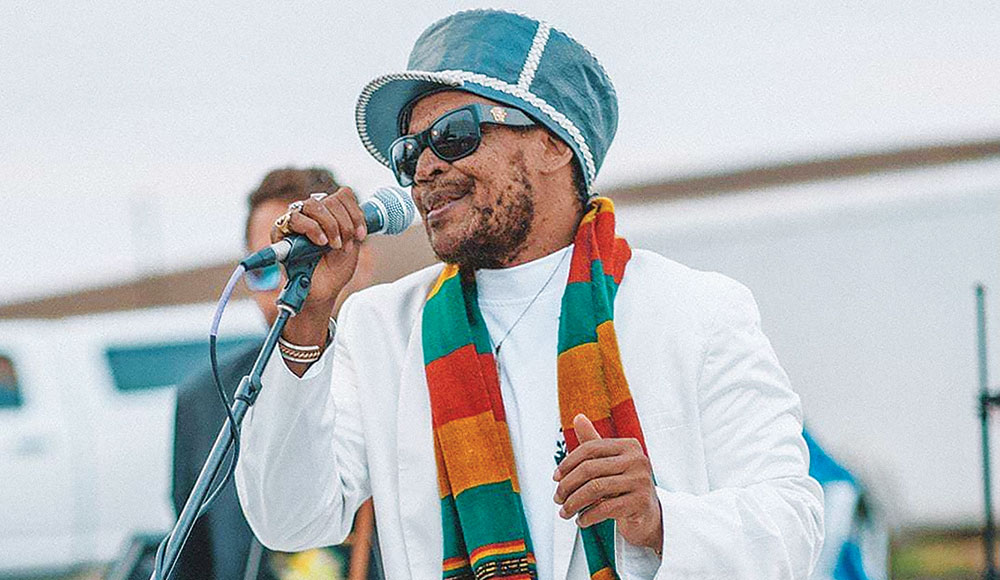In these weary, troubled times, many continue to find joy and inspiration in reggae music. So who is it, in 2025, that is carrying the torch, through the darkness, and raising it to the highest? It’s Black Uhuru—who will be appearing at Moe’s Alley on Saturday, Sept. 13.
Black Uhuru (formed in 1972), has always been one of the most scintillating bands in reggae. Following in the legendary footsteps of Bob Marley, Jimmy Cliff, Burning Spear and many others, Black Uhuru has carried the tradition of spreading the tenets of Rastafarianism farther and further to a wider audience.
It was in the 1980s that Black Uhuru (with their rotating members) was a supergroup with Derrick “Duckie” Simpson, Puma Jones and Michael Rose. Three iconic personas preaching the way of Jah and upspeaking the path of social justice. Their sounds permeated the fabric of Kingston, Jamaica.
Starting in 1997, Andrew Bees, alongside original member Duckie Simpson, took the microphone and the thunder rumbled once again. Black Uhuru had found another vocal lyricist who could channel the blessings and fiery embellishments the band had become famous for.
Andrew Bees grew up in the rough-and-tumble Waterhouse district of Kingston. Waterhouse was a revolutionary watershed of talent due to King Tubby’s futuristic tinkering. Tubby’s studio created dubplates for innovator Lee “Scratch” Perry, and the first remix, which spawned electronica and EDM. Andrew Bees was steeped and stewed in the culture, philosophies and music of Rastafarianism.
Having spent the last decade in Antioch, California, Bees uses it as a base for his world travels. “Growing up in Waterhouse, was massive all over the world and, you know, the media,” says Bees, whose thick patois has not lessened since his early years.
While Jamaica is glamorized as a reggae hub, it’s also often overlooked that modern-day Jamaica grew out of the slave trade that was brought there in the 16th century. “I grew up in Waterhouse, you know, we’re black and exist, and we’re far more than that media. That’s where we started.”
And yet, the reggae path out of a hardscrabble life was not unwanted or unknown. “It’s so fortunate that when I was a baby born, my father tell me that Andrew’s gonna live in that world,” says Bees.
It’s one thing to front a reggae band, but when you are called upon to stand with the elders of your community, it’s another level. “You know it’s a blessing. Because you know it’s a dynasty and we feel privileged to come and keep the dynasty,” Bees says.
Black Uhuru’s Tiny Desk performance is a master class in controlling the moment. Crowded into a tight space that might be considered a setback, Black Uhuru truly seems to feel the in-the-pocket grooves. Bees is sharp, concise and in step with Duckie’s bigger-than-life presence. Not to be left out, vocalist Elsa Green adds the sweet harmonies.
Compare that intimacy with Black Uhuru’s 2011 performance at Bonnaroo in Tennessee, in front of 85,000 people. How does a performer keep that connection with the music and the audience? “Differently. I just keep focused with the people, you know, the vibration of the people you know is what you know. So I always go with a positive vibration to the people and get grounded with them. And once that energy rise, that’s where I take it, you know,” Bees says.
And while the music is crucial, the message of Rastafarianism is what is being slipped between the mesmerizing trance of the bass and drums. Which is that Haile Selassie, former emperor of Ethiopia, was the fulfillment of Jah’s promise. “He who stands for Africa and he who stands for the countries of the world. He stands for everyone, you know. He was very structured, and very educated, and very determined to see that people understand themselves as human beings. A man who speak for the countries of the world and for every nation. You know? Who would love to see peace, love, harmony and upliftment for all race and no matter where you’re from. Right?”
Black Uhuru plays at 9pm on Sept. 13 at Moe’s Alley, 1535 Commercial Way, Santa Cruz. $40/adv, $45 door.











